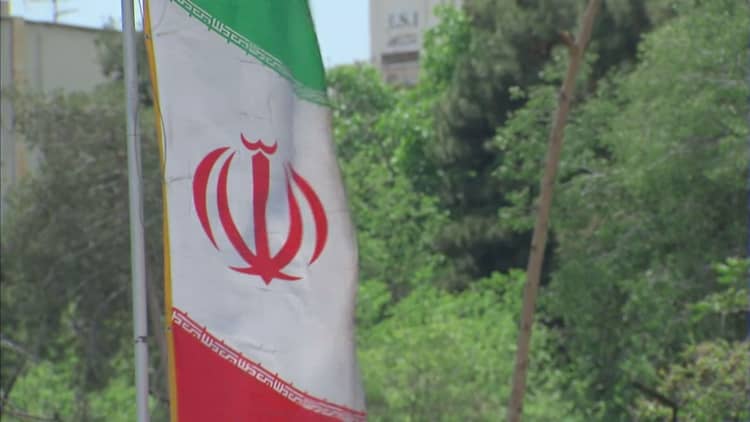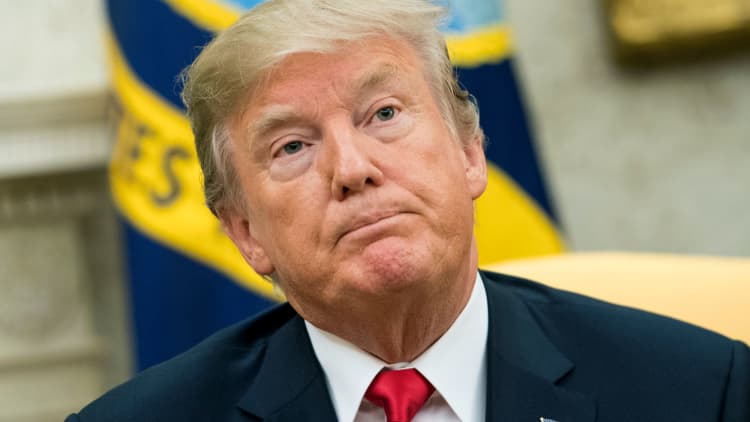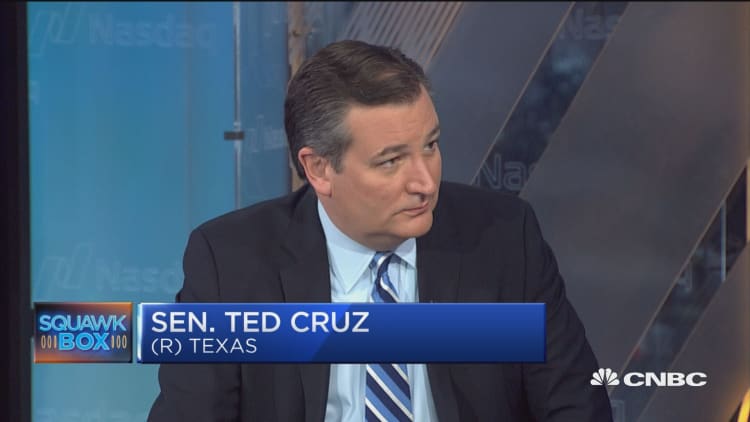
The Trump administration is expanding its efforts to contain Iran, announcing Friday that the president will tell Congress the 2015 nuclear agreement with Tehran is no longer in America's interest.
The announcement sets in motion a high-stakes campaign to "fix" the deal.
In a briefing with reporters, Secretary of State Rex Tillerson outlined the new strategy, which aims to address not just problems the administration sees in the nuclear deal but also in Iran's ballistic missile program and its role in conflicts throughout the Middle East, issues that were not addressed as part of nuclear negotiations.
The plan includes a diplomatic push to persuade U.S. allies to negotiate a new agreement that would effectively supplement the 2015 Iran nuclear deal. The administration will also ask European partners to join the United States in imposing new sanctions on elements of Iran's Revolutionary Guard Corps, a military unit loyal to Supreme Leader Ayatollah Ali Khamenei.
This is the pathway we think provides us the best platform from which to attempt to fix this deal. We may be unsuccessful. We may not be able to fix this deal.Secretary of State Rex Tillerson
The new U.S. course avoids some of the most drastic options the administration could have pursued. Still, it includes certain aspects that risk alienating the United States from its allies and pushing Iran to the point that it pulls out of the deal itself. If Iran leaves the accord, it could scrap limits placed on its nuclear program and eject international inspectors. Iran maintains its nuclear program is for civilian purposes only.
Following a monthslong review of the nation's Iran policy, Tillerson said the administration opted against pulling out of the Joint Comprehensive Plan of Action, the 2015 deal that lifted sanctions on Iran in exchange for limits on the oil-rich nation's nuclear program. President Donald Trump has threatened to abandon that deal since his campaign days.

The other JCPOA negotiators — China, France, Germany, Russia and the United Kingdom — as well as the International Atomic Energy Agency, which conducts inspections of Iranian facilities, say that Iran remains in compliance.
"Under the JCPOA, we don't disagree. We don't dispute that they're under technical compliance," Tillerson said. "One of the weaknesses is the bar, the standard, to remain in technical compliance is not that difficult or has not been that difficult for them to meet."
Working with Congress
To raise that bar, the administration will kick off its new approach by working with lawmakers to amend the Iran Nuclear Agreement Review Act, a U.S. law that gives Congress limited oversight of the international deal. Democrats and Republicans passed the bill into law in 2015 after President Barack Obama refused to negotiate the Iran deal as a treaty, effectively cutting Congress out of the process.
Under the Iran Review Act, the president must certify to Congress every 90 days that Iran is complying with the deal, and that the accord remains in the country's national security interest. On Friday, Trump will tell Congress that continuing to suspend sanctions is no longer worth the benefits the United States is accruing from the agreement as it is currently written, Tillerson said.

That gives Congress the option to reimpose those sanctions — which would blow up the deal — but Trump will tell them to hold their fire, Tillerson said. Instead, the White House proposes amending the Iran Review Act to establish a series of benchmarks, or "trigger points," that would automatically restore sanctions if Iran crosses one of the red lines.
The trigger points will include aspects of the Iran nuclear deal already in force, but the administration will also suggest new benchmarks related to Iran's ballistic missile program. That is a risky proposal because Iran has rejected efforts to curb its weapons program as part of nuclear negotiations. When it lifted sanctions on Iran, the United Nations called on its leaders to cease ballistic missile tests but did not explicitly ban the nation from carrying them out.
The amendment to the Iran Review Act would also seek to address so-called sunset clauses in the nuclear deal. Certain key aspects of the agreement expire 10 to 15 years after its implementation, which has roiled the Trump administration and foreign policy hawks.
The idea is to create a mechanism under U.S. law that would snap sanctions back into place for certain Iranian actions, even after prohibitions against those actions expire under the international agreement. That could also be anathema to Iran, which says pushing back sunset provisions is a nonstarter.

"This is the pathway we think provides us the best platform from which to attempt to fix this deal. We may be unsuccessful. We may not be able to fix this deal," Tillerson said in a briefing Thursday. He added that if unsuccessful, the United States could pull out of the international deal.
Tillerson said the amendment gives members of Congress an opportunity to express their views on the deal. The administration has been briefing lawmakers for several weeks, he said.
Senate Foreign Relations Committee Chairman Bob Corker, who authored the Iran Review Act, has drafted legislation to automatically snap sanctions back into place, The New York Times reported. Corker, R-Tenn., developed the framework with Iran hawk Sen. Tom Cotton, R-Ark., and administration officials, according to the Times.
"I don't want to suggest to you that this is a slam dunk up there on the Hill," Tillerson said. "We know it's not. People have very strong feelings about this nuke arrangement with Iran."
Diplomatic effort
Support from Congress will "strengthen" the diplomatic push to bring U.S. partners on board, according to Tillerson. He said discussions with Europeans have been ongoing for months, and he even broached the subject with Iranian Foreign Minister Mohammad Javad Zarif on the sidelines of the U.N. General Assembly last month.
The administration will push Europeans to place new sanctions on Iran in response to its ballistic missile program, Tillerson said. It will also work with partners to lay the groundwork for a complementary international deal with Iran, which would address what happens when certain provisions of the existing accord expire and how to gain access to military sites currently off-limits in Iran.
Following Trump's remarks on Friday, the heads of state of France, Germany and the U.K. said they are "concerned by the possible implications" in a joint statement. However, they said they share Trump's concerns about Iran's missile program and its "regional activities" and stand ready to take measures to address those issues, including through "constructive dialogue" with Iran.
"Our governments are committed to ensuring the JCPoA is maintained. Independent of the JCPOA, we need to make sure that our collective wider concerns are being addressed," the leaders said.
The Trump administration will also seek European sanctions on the Revolutionary Guards Corp, which is deeply embedded in the Iranian economy.
The U.S. Treasury Department sanctioned individuals and businesses tied to the Revolutionary Guards on Friday. The sanctions are based on the guards' support for terrorism, for example through funding terror groups or recruiting fighters to wage battle in places like Syria.
The administration opted against designating the Revolutionary Guards a terrorist group because doing so risks unintended consequences that could be detrimental to U.S. military actions and the administration's overall Iran strategy, according to Tillerson.



